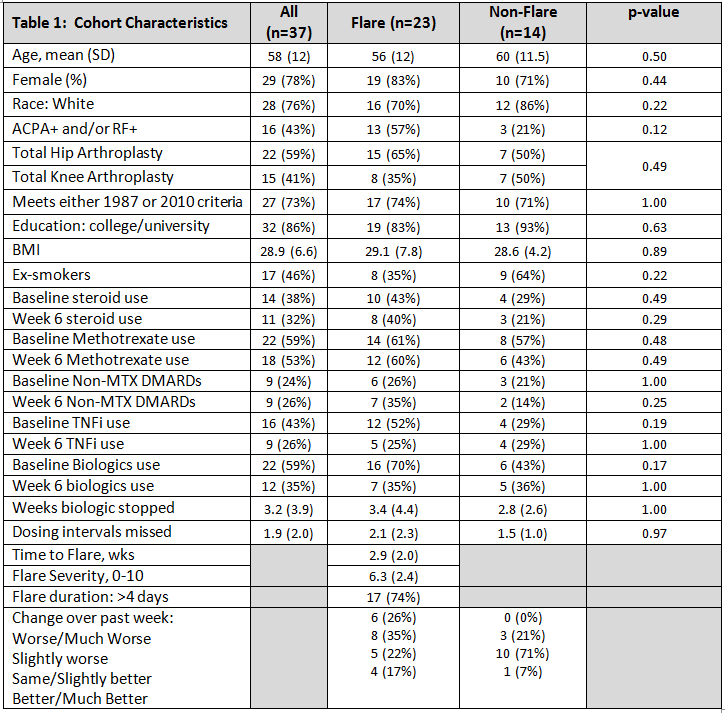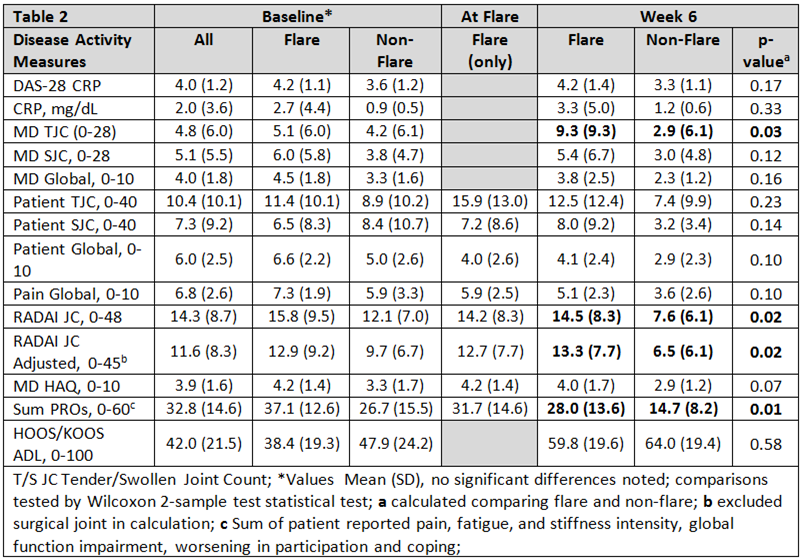Session Information
Session Type: ACR Poster Session C
Session Time: 9:00AM-11:00AM
(flare) after joint surgery, as medication is withdrawn to mitigate infection
risk. We aimed to describe rates and characteristics of RA flare within 6 weeks
of total hip (THA) and total knee arthroplasty (TKA).
TKA/THA were queried every week about any change in RA status including pain
and function (MDHAQ, HOOS/KOOS ADL). Baseline
(BL) characteristics, BL and 6 week DAS-28, were collected.
RA Flare was defined by Patient Report (yes/no, “Are you in a flare?”). Flare
classification was determined by concordance between patient report of flare
and MD assessment of flare, by chart review including joint counts, excluding
the surgical joint. Medication use was standard of care: biologic DMARDs
stopped; steroids and MTX continued.
Results :
Of 37 RA pts recruited, most were female, white and
had undergone THA (Table 1). Mean
(SD) time to flare was 2.9(2.0) wks in 23/37 (62%)
patients, with a self-rated flare severity of 6.3(2.4), duration >4 days in
74%. All but 6 stopping biologics flared.
Numerically, more flarers took steroids, MTX and
biologics. Disease activity at baseline and 6 weeks remained moderate for both
groups (Table 2). Though numerically
higher in flares disease activity and function at BL and change over 6 weeks
was similar. At 6 weeks, patients reporting flare had significantly higher
tender joint counts [RADAI 14.5(8.3) vs. 7.6(6.1), p=0.02], rescored to remove the
surgical joint [RADAI 13.3(7.7) vs. 6.5(6.1), p=0.02]. Worse MDHAQ [4.0(1.7)
vs. 2.9(1.2), p=0.07] and RAPID3 [13.8(5.3) vs. 14.7(8.2), p=0.09] approached
significance.
Conclusion: Post-op flares are
frequently reported, and rated as severe in RA patients undergoing THA/TKA.
Numerically, flares are more frequent in patients stopping biologics. Increased
RA related worsening joint pain and function seen in those whose
RA worsens after surgery may contribute to poor long-term outcomes for RA
patients undergoing THA/TKA. Further studies of post-op flare are needed.
This study was supported by the
Clinical Translational Science Center (CTSC) (UL1-TR000457-06)
To cite this abstract in AMA style:
Goodman SM, Friedlander R, Figgie C, Hoang A, Andersen K, Pernis AB, Rozo CT, DiCarlo EF, Figgie MP, Donlin LT, Bykerk V. Flares Occur Frequently in RA Patients Undergoing Arthroplasty [abstract]. Arthritis Rheumatol. 2015; 67 (suppl 10). https://acrabstracts.org/abstract/flares-occur-frequently-in-ra-patients-undergoing-arthroplasty/. Accessed .« Back to 2015 ACR/ARHP Annual Meeting
ACR Meeting Abstracts - https://acrabstracts.org/abstract/flares-occur-frequently-in-ra-patients-undergoing-arthroplasty/


